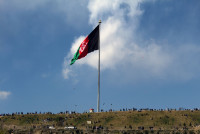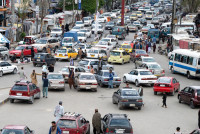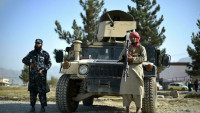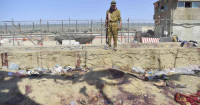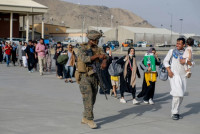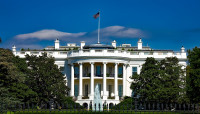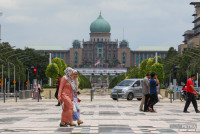FRANKFURT/MUMBAI – The Afghan central bank ran down most of its United States dollar cash reserves in the weeks before the Taliban took control of the country, according to an assessment prepared for Afghanistan’s global donors, exacerbating the current economic crisis.
The confidential two-page brief, written early this month by senior international economic officials for institutions including the World Bank and International Monetary Fund, said the country’s severe cash shortage began before the Taliban took control of Kabul.
It criticised how the bank’s former leadership handled the crisis in the months before the Taliban’s conquest, including decisions to auction unusually large amounts of US dollars and move money from Kabul to provincial branches.
“FX (foreign exchange) reserves in CB’s (central bank’s) vaults in Kabul have depleted, the CB cannot meet... cash requests,” said the report, seen by Reuters.
“The biggest source of the problem is the mismanagement at the central bank prior to the Taliban takeover.”
Shah Mehrabi, chairman of the bank’s audit committee who helped oversee the institution before the Taliban took over, and is still in the post, defended the lender’s actions, saying it is trying to prevent a run on the local Afghani currency.
The extent of the cash shortage can be seen on the streets of Afghan cities, where people have been queuing for hours to withdraw dollar savings amid strict limits on how much they can take out.
Even before the shock of the Western-backed government’s collapse, the economy was struggling, but the return of the Taliban and abrupt end of billions of dollars in foreign aid have left it in deep crisis.
Prices for staples like flour have spiralled, while work has dried up, leaving millions facing hunger as winter approaches.
Aid dries up
Under the previous government, the central bank relied on cash shipments of US$249 million (RM1 billion), delivered roughly every three months in boxes of bound US$100 notes and stored in the vaults of the central bank and presidential palace, according to three people with direct knowledge of the matter.
That money has dried up as foreign powers shy away from dealing directly with the Taliban, which fought against foreign troops and the ousted government. Thousands of people – many of them civilians – died.
The bank, which plays a key role in Afghanistan because it distributes aid from countries like the US, yesterday said it has finalised a plan to meet the country’s foreign currency needs. It gave no details.
The hard currency crunch is making it difficult for the Taliban to meet basic needs, including paying for power or disbursing salaries to government employees, many of whom have not been paid for months.
Afghanistan’s roughly US$9 billion in offshore reserves was frozen as soon as the Taliban captured Kabul, leaving the central bank with just the cash in its vaults.
According to the report, the bank auctioned US$1.5 billion between June 1 and August 15 to local foreign exchange dealers, which it said is “strikingly high”.
“By August 15, the central bank had an outstanding liability of US$700 million and 50 billion Afghanis (US$569 million) towards commercial banks,” it said, adding that this is a major factor in emptying its coffers.
Afghan central bank official Mehrabi said, however, that although almost US$1.5 billion in auctions has been announced, the actual amount sold is US$714 million.
He said the bank has “continued its foreign exchange auction to reduce the depreciation and inflation”.
Money missing?
The report also questioned a decision by the central bank to shift some of its reserves to provincial branches, putting it at risk as Taliban militants made advances across the country from late 2020 in the run-up to their victory.
It said around US$202 million was kept in these branches at the end of last year compared with US$12.9 million in 2019, and that the cash was not moved as provinces started to fall to the insurgents.
“Some money is reportedly lost (stolen) from ‘some’ of the provincial branches,” said the report, without specifying how much.
Mehrabi said the central bank is investigating money “stolen” from three of its branches, although not by the Taliban. He gave no further details.
Former bank governor Ajmal Ahmady, who left the country the day after Kabul fell, did not respond to emails and other messages requesting comment on his and the lender’s actions in the months before the Taliban returned to power.
Ahmady tweeted in recent weeks that he did his best to manage the situation, and blamed any cash shortfall on the freezing of central bank assets abroad.
In his statements, he said the bank managed the economy well prior to the fall of Kabul, and that he felt bad about leaving staff behind, but feared for his safety.
He has said no money was stolen from any reserve account. – Reuters, September 30, 2021




